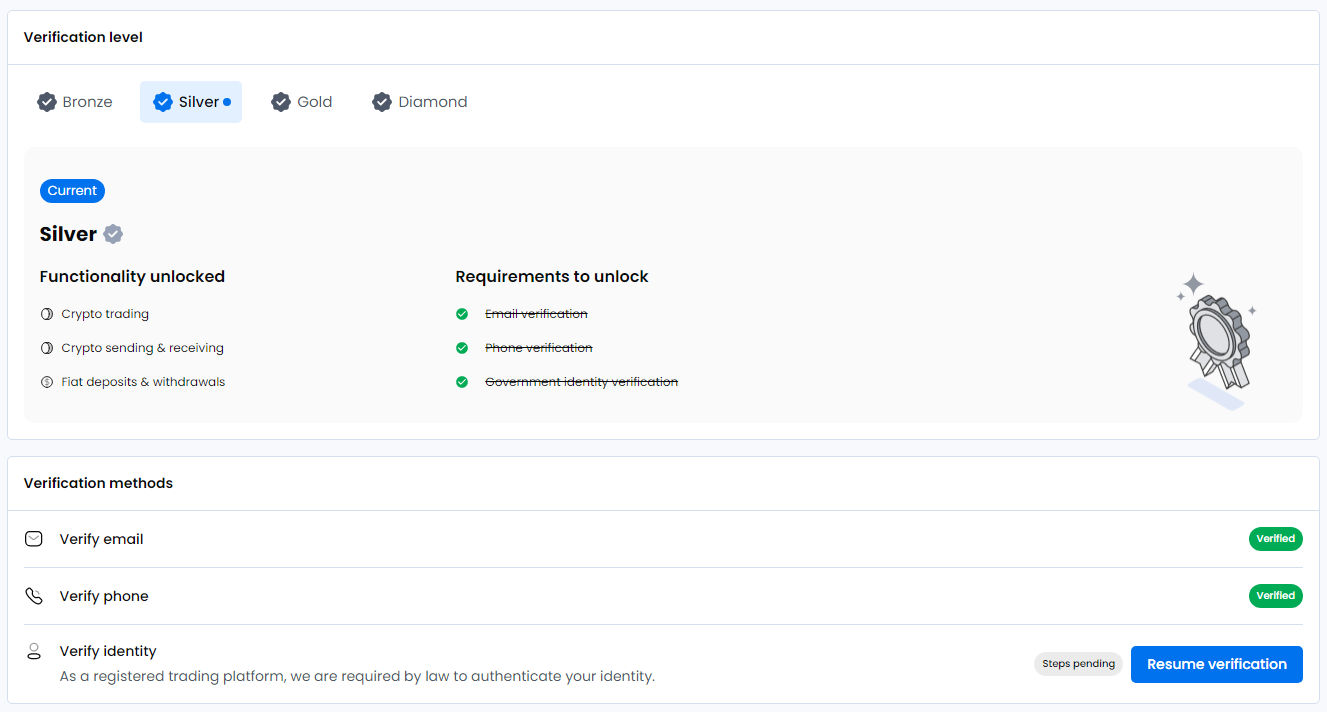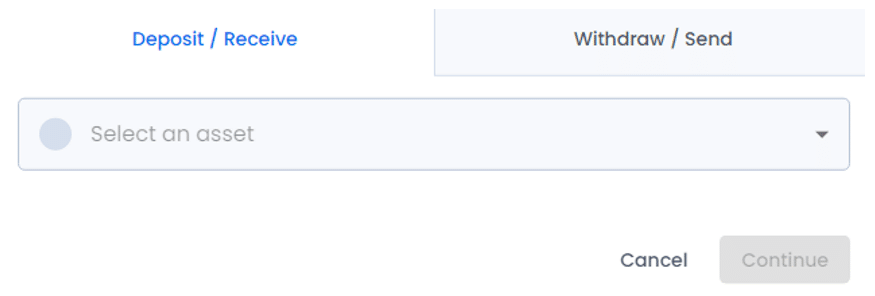We may earn a commission from links on our site, but this doesn’t affect our reviews. Learn more.
Hedge With Crypto is an independent publisher that provides objective and free content. Articles on our site may include links to our partners. If you click on these links, we may earn a commission. However, our editorial content remains unbiased, reflecting our own opinions or the general information available. For more information on our company policies, read the Affiliate Disclosure, Privacy Policy, and Terms & Conditions.
How To Buy Crypto In New Zealand
This information is general in nature and is for educational purposes only. Hedge With Crypto does not provide financial advice nor does it take into account your personal financial situation. We encourage you to seek financial advice from an independent financial advisor where appropriate and make your own inquiries.
TABLE OF CONTENTS
The cryptocurrency market reached heights that saw the prices increase tenfold, while several exciting projects have found mainstream adoption. The snowballing interest in the blockchain sector has led many New Zealand residents to consider how they can invest in crypto.
Here's a quick guide on how you can buy crypto in New Zealand:
- Compare compatible crypto exchanges.
- Create an account and pass KYC.
- Deposit funds to the exchange.
- Buy crypto.
Guide To Buying Crypto In New Zealand
The section below provides a tutorial on investing in crypto within New Zealand. If you're a citizen but no longer reside in NZ, we also have an international guide that explains how to buy cryptocurrency in other countries.
1. Compare and select a crypto exchange
First off, potential investors must decide on a platform that suits their cryptocurrency needs. There are several international and local platforms that provide buying/selling/trading services to NZ residents. Additionally, more experienced traders may want to consider decentralized or P2P exchanges. Beginners should likely stick to centralized exchanges as they are the easiest to navigate. Other factors worth considering include:
- Supported countries, fiat, and digital currencies
- Deposit methods and trading limits
- Fees
- User interface
- Security history (have there been any hacks?)
- Customer support features
- Included features (staking, dollar-cost averaging, advanced trades, etc.)
For the purpose of this guide, we show how to buy Bitcoin using the cryptocurrency exchange Swyftx. Although Swyftx is a good option, there are plenty of viable alternatives if investors prefer a different platform.
2. Register an account on the exchange
The next step is to create a new account on the selected exchange. For the most part, this process is simple. Many registration processes can be accessed on a website’s home page by clicking “Get Started” or “Register”. Investors can use our signup link for Swyftx to receive $20 BTC with a referral code to get their portfolio up and running. Next up, enter a valid email address and password, as well as a full name and mobile number. Agree to the terms and conditions to finalize the process and create the account.

Once the account has been created and email/phone verified, the next step is to pass Know Your Customer (KYC) verification. This is a requirement for customers to deposit and withdraw fiat currency to and from their Swyftx portfolios. The KYC process isn’t too lengthy and should only take about two minutes to complete.

New customers must provide images of a government-issued identification document such as a driver’s license or passport. Ensure that any photos uploaded aren’t blurry – it can be quicker to complete verification on a mobile phone. Once this process is complete, investors can deposit/withdraw NZD and other fiat currencies.
Before continuing, it is highly recommended that users enable 2FA on their exchange accounts—regardless of which platform is being used. On Swyftx, this option can be found under “Settings>Security.”

3. Deposit funds to a wallet
The next step is to fund the newly created exchange account. Most beginners will likely want to use their local currency (NZD), although investors that have already embarked on their journey may instead deposit cryptocurrency. Swyftx is one of only a handful of exchanges that support direct NZD deposits to a wallet.
As of writing this article, Kiwi residents can only fund their accounts with NZD via debit card. This fast transaction method can be a little expensive compared to a bank transfer. Swyftx is looking at solutions to once again support free bank deposits for NZD.

There are two options for depositing funds. Either head over to the left sidebar pane and click the “Deposit” tab, or select the blue Deposit button in the top right corner of the webpage. Then, select the asset type to receive in the dropdown menu and choose the best-suited deposit method. If depositing NZD, this will be a debit card. Finally, input all the relevant details, including the card number and the amount of funds to be sent. Confirm the transaction, and before long, the Swyftx account should be funded.
4. Buy crypto
Now the exchange account wallet is topped up with money, it’s time to buy crypto. On most platforms, this process will be relatively simple. Select a button/webpage such as “Asset list,” “Cryptocurrencies,” or “Buy/Sell” to bring up a list of digital currencies for sale. Choose the desired coin to open its individual buying page. For example, on Swyftx the option to Buy/Sell Bitcoin and other individual currencies can be found to the right of its basic information.

Finally, confirm how much of the crypto will be purchased, then review and confirm the transaction. That’s it! Before long, the digital currency being bought should land in the exchange wallet.
Where To Buy Crypto In New Zealand
New Zealand is a relatively small nation (in terms of population) and doesn’t have a huge market for local crypto exchanges. Very few businesses offer the sale of crypto solely based in the nation. However, several regulated and well-trusted exchanges that are comprised of local and international platforms serve NZ residents.
Ready to invest? Find out which are the best crypto exchanges in NZ.
| EXCHANGE | CRYPTO ASSETS | TRADING FEES | RATING | PROMOTION | WEBSITE | REVIEW |
|---|---|---|---|---|---|---|
 Swyftx Swyftx
|
422 |
0.6% |
Rating
We provide an overall weighted average rating out of 5 stars. Our ratings are based on objective criteria like the ease of use, fees, deposit methods, customer support and availability. Our reviews are not influenced by 3rd parties. Click here for further information about our rating methodology and a full list of categories we review against. 4.9 / 5 |
$20 Bitcoin for creating a verified account |
Visit Swyftx | Swyftx Review |
|
|
385 |
0.1% (spot) and 0.02% / 0.04% (Futures) |
Rating
We provide an overall weighted average rating out of 5 stars. Our ratings are based on objective criteria like the ease of use, fees, deposit methods, customer support and availability. Our reviews are not influenced by 3rd parties. Click here for further information about our rating methodology and a full list of categories we review against. 4.8 / 5 |
Up to $100 welcome bonus |
Visit Binance | Binance Review |
 Easy Crypto Easy Crypto
|
160+ |
0.5 – 1.35% spread |
Rating
We provide an overall weighted average rating out of 5 stars. Our ratings are based on objective criteria like the ease of use, fees, deposit methods, customer support and availability. Our reviews are not influenced by 3rd parties. Click here for further information about our rating methodology and a full list of categories we review against. 3.8 / 5 |
None available at this time |
Visit Easy Crypt… | Easy Crypto Revi… |
There are several other options NZ residents can consider for buying Bitcoin and other cryptocurrencies:
Guide To Buying Crypto In New Zealand
The section below provides a tutorial on investing in crypto within New Zealand. If you're a citizen but no longer reside in NZ, we also have an international guide that explains how to buy cryptocurrency in other countries.
1. Compare and select a crypto exchange
First off, potential investors must decide on a platform that suits their cryptocurrency needs. Several international and local platforms provide buying/selling/trading services to NZ residents. Additionally, more experienced traders may want to consider decentralized or P2P exchanges. Beginners should likely stick to centralized exchanges as they are the easiest to navigate. Other factors worth considering include:
- Supported countries, fiat, and digital currencies
- Deposit methods and trading limits
- Fees
- User interface
- Security history (have there been any hacks?)
- Customer support features
- Included features (staking, dollar-cost averaging, advanced trades, etc.)
For this guide, we show how to buy Bitcoin using the cryptocurrency exchange Swyftx. Although Swyftx is a good option, there are plenty of viable alternatives if investors prefer a different platform.
2. Register an account on the exchange
The next step is to create a new account on the selected exchange. For the most part, this process is simple. Many registration processes can be accessed on a website’s home page by clicking “Get Started” or “Register”. Investors can use our signup link for Swyftx to receive $20 BTC with a referral code to get their portfolio up and running. Next up, enter a valid email address and password, as well as a full name and mobile number. Agree to the terms and conditions to finalize the process and create the account.

Once the account has been created and email/phone verified, the next step is to pass Know Your Customer (KYC) verification. This is a requirement for customers to deposit and withdraw fiat currency to and from their Swyftx portfolios. The KYC process isn’t too lengthy and should only take about two minutes to complete.

New customers must provide images of a government-issued identification document such as a driver’s license or passport. Ensure that any photos uploaded aren’t blurry – it can be quicker to complete verification on a mobile phone. Once this process is complete, investors can deposit/withdraw NZD and other fiat currencies.
Before continuing, it is highly recommended that users enable 2FA on their exchange accounts—regardless of which platform is being used. On Swyftx, this option can be found under “Settings>Security.”

3. Deposit funds to a wallet
The next step is to fund the newly created exchange account. Most beginners will likely want to use their local currency (NZD), although investors that have already embarked on their journey may instead deposit cryptocurrency. Swyftx is one of only a handful of exchanges that support direct NZD deposits to a wallet.
As of writing this article, Kiwi residents can only fund their accounts with NZD via debit card. This fast transaction method can be a little expensive compared to a bank transfer. Once again, Swyftx is looking at solutions to support free bank deposits for NZD.

There are two options for depositing funds. Either head over to the left sidebar pane and click the “Deposit” tab, or, select the blue Deposit button in the top right corner of the webpage. Then, select the asset type to receive in the dropdown menu and choose the best-suited deposit method. If depositing NZD, this will be a debit card. Finally, input all the relevant details, including the card number and the amount of funds to be sent. Confirm the transaction, and before long, the Swyftx account should be funded.
4. Buy crypto
Now the exchange account wallet is topped up with money, it’s time to buy crypto. On most platforms, this process will be relatively simple. Select a button/webpage such as “Asset list”, “Cryptocurrencies” or “Buy/Sell” to bring up a list of digital currencies for sale. Choose the desired coin to open its buying page. For example, on Swyftx the option to Buy/Sell Bitcoin and other individual currencies can be found to the right of its basic information.

Finally, confirm how much of the crypto will be purchased, then review and confirm the transaction. That’s it! Before long, the digital currency being bought should land in the exchange wallet.
The Legal Status of Buying Crypto In New Zealand
Cryptocurrency is legal in New Zealand and can be owned, traded, and sold. This includes associated digital assets such as NFTs. In general, there is a lot of grey area around how the NZ government and lawmakers treat crypto in the nation.
The crypto asset class is treated as “property” rather than as a foreign currency. Financial institutions providing crypto-related services can operate within the nation under the same guidelines as any other financial institution. In general, crypto isn’t particularly well-regulated in the nation, and there are still many loose ends.
What You Need To Buy Crypto In New Zealand
There aren’t too many requirements for NZ residents to open up their crypto portfolio by purchasing Bitcoin or another digital currency. Investors will need:
- Funds. Most first-time investors will use NZD to fund their ventures. However, more experienced traders may already own digital currency, which they can use to fund their exchange accounts.
- Basic info. Most crypto exchanges will require new customers to submit an email address and password to register an account. Other platforms may require a mobile number. We recommend manually adding a phone number even if it isn’t mandatory, as enabling 2FA adds an extra layer of security.
- Government documents. Kiwis who wish to invest in crypto using NZD must pass KYC protocols on most available exchanges. This process requires a government-issued ID document, like a passport. Some KYC processes also require a selfie with mobile and basic residential information.
- Crypto wallet. Crypto and Bitcoin wallets are wallets used to store digital tokens and coins. Most exchanges come with built-in wallets that automatically store newly purchased cryptocurrencies. However, investors should consider using a reputable cryptocurrency wallet to ensure the safety of their assets.
The Risks of Buying Cryptocurrency
Cryptocurrency is an inherently risky investment. There are many risk factors worth considering before deciding to put hard-earned money toward the asset class:
- Market volatility. The cryptocurrency market is notoriously volatile. Even “safer” assets like Bitcoin and Ethereum have been known to experience price swings of 20+% overnight. The volatility is even more pronounced in altcoins, with some coins’ values dropping/gaining thousands of percent in only a few hours. This can be problematic for investors needing short-term liquidity.
- Counter-party risk. Most newer investors will use custodial, centralized exchanges like Swyftx or Binance to hold their assets. However, this comes with risks, as the community saw after the monumental collapse of the billion-dollar exchange FTX in 2022. Keeping coins and tokens in a reliable cryptocurrency wallet, such as ZenGo or Trust Wallet, can significantly mitigate this risk.
- Novelty. Cryptocurrency is a relatively new currency, having only been around since 2009. Due to this, some kinks are still being ironed out in the technology. For example, bugs in the code of certain blockchains can be exploited, leading to loss of funds. Such errors don’t usually result in investors’ funds being stolen; rather, the coin they’ve accumulated is debased.
- Lack of regulatory oversight. Governments are still figuring out the best way to oversee the use of cryptocurrency, a financial system designed to avoid regulation. At this point, it seems clear that a middle ground between government regulation and decentralization will need to be reached for crypto to reach the mainstream. How governments ultimately decide to legislate the crypto sector could significantly alter the value of certain investments.
Crypto Tax Obligations In New Zealand
New Zealand is unique in how it treats crypto tax obligations. As the nation doesn’t have a Capital Gains Tax (CGT) system, digital currencies are taxed as income. Tax must be reported anytime a “disposal event” occurs. Customers who buy crypto and leave it in an exchange wallet will not have any tax requirements until they sell, convert, or gift it.
Remember that crypto is a new financial product and the guidelines and legislation constantly evolve. For the most up-to-date information, check the NZ Inland Revenue website.